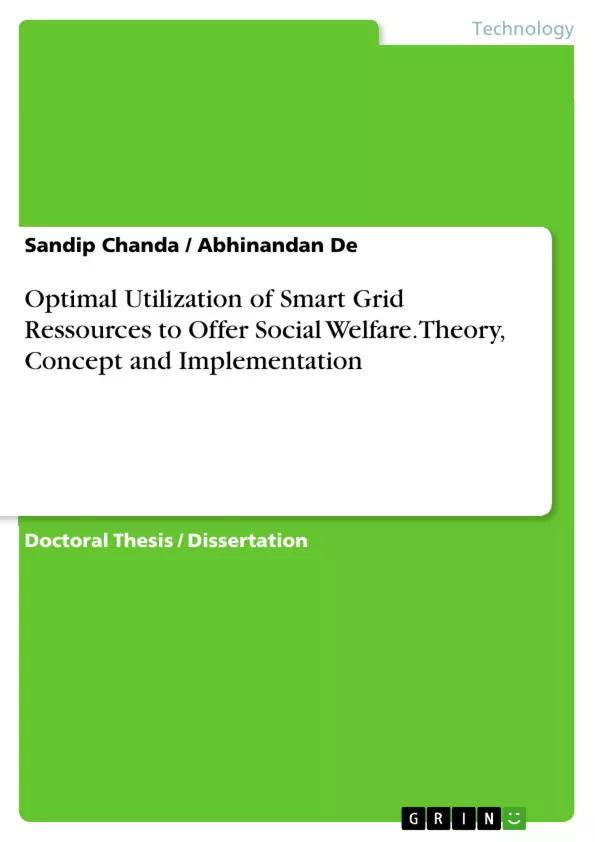In this thesis methodologies to assist system operators in avoiding problems related to transmission line congestion, optimisation of operational standard management cost , social welfare optimisation and small signal stability optimisation in the context of traditional and smart power networks are been developed, illustrated and analyzed.
The developed methodologies include operational standard management, contingency filtering and security control procedures. The contingencies analyzed in the assessment methodologies are those of N-1, N-2, N-3 and in some cases N-4 security criterion. The security assessment with contingencies are based on worst possible inadvertent state and for the identification of the same some sensitivity indices namely line loading index, congestion sensitivity index and demand sensitive loading factors have been developed.
However, the security control methodologies are essentially re-dispatching techniques based on OPF solutions whose formulation includes constraints related to voltage profile, transmission line congestion, transmission line loss, load curtailment and small signal stability phenomena that limit system operation. The developed methodologies should be applied once a market dispatching solution is available.
Inhaltsverzeichnis (Table of Contents)
- Introduction
- Motivation behind the Present Research Work Conducted
- Social Welfare Optimisation-National Scenario
- Social welfare Optimisation –International Scenario
- Thesis Objectives
- Literature Review
- Operational Standard Management Strategies Emphasizing Transmission Line Congestion
- Optimisation of Operational Standard Management Cost
- Price Sensitive Modelling of Power Networks
- Small Signal Stability Analysis of Social Welfare Optimization Techniques
- Tools and Methodologies used
- Optimal Power Flow (OPF)
- Base Case Analysis
- Congestion Management with Contingency Filtering
- Loading Margins and their Impacts
- Congestion Management Cost
- Social Welfare Optimisation
- Price Sensitive Modelling of Smart Power Networks
- Small Signal Analysis of Social Welfare Optimisation Technique
- Eigen Value Analysis
- Time Domain Simulation
- Hardware and Software
- Thesis Organisation
- Power System Optimisation With Operational Constraints
- Power System Optimisation
- Classical Optimisation Technique
- Particle Swarm Optimisation Technique
- Differential Evolution based Optimisation Technique
- Application of Stochastic Optimization Algorithms on System Model
- Power System Optimisation
Zielsetzung und Themenschwerpunkte (Objectives and Key Themes)
This research delves into the optimal utilization of smart grid resources to enhance social welfare. The work examines various theoretical, conceptual, and implementation aspects of this complex issue.
- Optimization of social welfare within power systems
- Integration of smart grid resources for improved efficiency
- Analysis of operational constraints in power systems
- Application of various optimization techniques for enhancing social welfare
- Exploration of the national and international scenarios of social welfare optimization
Zusammenfassung der Kapitel (Chapter Summaries)
The introductory chapter establishes the motivation behind the research, explores the current national and international landscape of social welfare optimization, and outlines the objectives of the study. It further reviews relevant literature, focusing on operational standard management strategies, optimization of operational costs, price-sensitive modeling of power networks, and small signal stability analysis within the context of social welfare optimization. The chapter then details the tools and methodologies employed, including optimal power flow analysis, base case analysis, congestion management, social welfare optimization techniques, and small signal analysis. Finally, it presents the organization of the thesis.
Schlüsselwörter (Keywords)
The primary focus of this research revolves around the concepts of smart grids, social welfare optimization, power system optimization, operational constraints, and various optimization techniques, such as classical optimization, particle swarm optimization, and differential evolution.
Frequently Asked Questions
What is the focus of this research on Smart Grids?
The research focuses on the optimal utilization of smart grid resources to enhance social welfare, specifically addressing transmission line congestion, operational management costs, and small signal stability.
What is social welfare optimization in power systems?
Social welfare optimization aims to balance the needs of all participants in a power market by minimizing operational costs and maximizing efficiency, often through techniques like Optimal Power Flow (OPF).
How does the study address transmission line congestion?
The thesis develops methodologies for contingency filtering (N-1 to N-4 criteria) and security control procedures using sensitivity indices to identify and manage congested lines.
What optimization techniques are used in this thesis?
The work applies several algorithms, including Classical Optimization, Particle Swarm Optimization (PSO), and Differential Evolution (DE) to solve complex power system constraints.
What is Small Signal Stability Analysis?
It is a method used to evaluate the stability of a power system under small disturbances. The research uses Eigen Value Analysis and Time Domain Simulation to ensure that social welfare optimization does not compromise grid stability.
- Citation du texte
- Dr. Sandip Chanda (Auteur), Dr. Abhinandan De (Auteur), 2015, Optimal Utilization of Smart Grid Ressources to Offer Social Welfare.Theory, Concept and Implementation, Munich, GRIN Verlag, https://www.grin.com/document/477247



